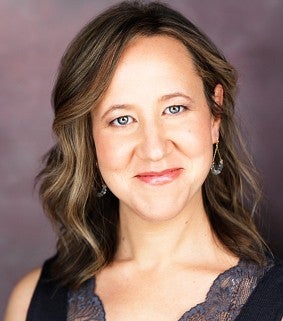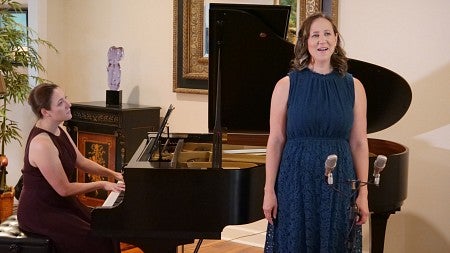
On a mission to uplift underrepresented composers, School of Music and Dance alumna Amalia Osuga (DMA Vocal Performance) and Professor Stephen Rodgers have teamed up to bring the overlooked works of American pianist and composer Mary Howe to the forefront. In November, they released the world-premiere recordings of six songs by Howe.
The songs are featured on Art Song Augmented, Rodgers’ website devoted to marginalized composers. “It is such a joy to hear these songs performed so beautifully, and to think that students, teachers, and lay listeners can discover Howe's glorious music through these equally glorious recordings,” Rodgers said.

“It's been really special to take on this project,” Osuga said. “Mary Howe is a composer, like many female composers of her time, who has not been studied enough, recognized enough.”
Osuga performs “Fragment” by Mary Howe, with Aimee Fincher as collaborative pianist
Discovering Howe’s Music
Osuga, a native New Yorker, first discovered Howe’s music in 2021 while researching underrepresented female composers at the New York Public Library. At the time, she was conducting research for her project, Her Art in Song, which was funded through a New Faculty Research Grant. She received the grant in her role as an Assistant Professor of Voice at the University of Alabama Huntsville. “I actually discovered her music in manuscript form!” she said. Fascinated by Howe’s work, Osuga scanned about 250 pages of the original manuscripts.
Osuga later learned some of the songs had been published before, and she wanted to give voice to those that had not been recorded. “I wanted to see if I could bring my experience, interest, and love of the poetry and how it combines with the music, to bring about a first recording that people can then hopefully use to inform recordings of those songs and her music in general in the future,” she said.
Osuga and Rodgers had stayed connected since her graduation from the School of Music and Dance (SOMD) in 2018, and after Osuga’s discovery, they decided to collaborate and record Howe’s songs.
Why Howe?
Osuga was drawn to Howe for several reasons. For one, she admires Howe for composing in multiple languages. Of the six songs she and Rodgers recorded, three different languages are represented. “I love that Mary Howe is an American composer who is fascinated with and feels comfortable with other languages,” Osuga said. “It’s unusual for an American composer.”
Osuga was also drawn to the flexibility of Howe’s songs, noting that her musical language changes depending on the poetry she is setting. “From a theoretical standpoint, it's very bold for her time,” Osuga said. “Her musical language is very creative.”
Osuga also admires Howe as a person. Howe was married with three children when she pursued her artist diploma in composition at forty years old. “I'm also a mom, so the fact that she persevered, trying to get her music out there and make a name for herself while juggling school and motherhood, is inspirational.”
Finally, she says Howe’s songs are simply deserving of recognition. “Her music is just beautiful and needs to be heard,” Osuga said. “I think that female composers and women in general in the arts need to be front and center and heard more.”
Future Work
Osuga plans to continue her work to bring visibility to marginalized female composers. Through Her Art in Song, a grant-funded project focused on highlighting the musical and poetic voices of women in art song through performance, education and research, she will compete at the New York City Song Slam on January 19. She will perform a new work set to poetry by female poet, Edna St. Vincent Millay.
Rodgers is also committed to continuing to elevate underrepresented composers. In all, he has created nearly 30 world-premiere video recordings of works by such composers. In his role as the Edmund A Cykler Chair, he also mentors Cykler Song Scholar recipients who research underexplored song repertoire.
